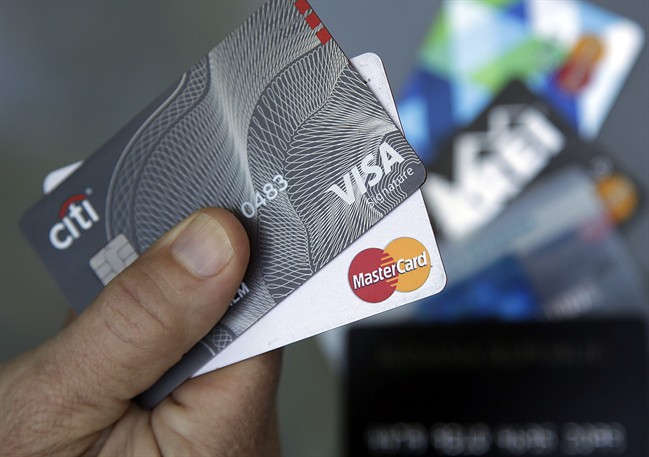Lisa Butler, 37, had her wallet stolen on May 15 in Toronto. Two of her credit cards were compromised and the thieves were able to guess her PIN, too. Within hours, they had racked up $14,000 in bills, mostly at the city’s landmark Eaton Centre shopping mall.

“It was really violating,” Butler told Global News. “I’m so vigilant about these things when I travel, but I take my safety in Toronto kind of for granted.”
Though Butler suffered no monetary loss from the incident, getting her financial life back on track has taken hours on the phone — and the process was far from straightforward, she told Global News.
READ MORE: Reality check: You don’t need RFID protection in your wallet
What added a layer of complexity to her case was the fact that the thieves were using her PIN.
WATCH: Tips to avoid fraud
How fraudsters can get your PIN
The easiest way for muggers to get your PIN is to open your wallet and find the precious four-digit code scribbled on a piece of paper. (Never write down your PIN, warns the RCMP. Instead, memorize it.)
That, though, wasn’t Butler’s case. Criminals were able to somehow guess her PIN.
Criminals are often able to crack your secret code if it’s something obvious like your birthday or part of your phone number, information that they can generally find in your wallet as well, said Tara Zecevic, vice-president of Fraud Prevention and Identity Management at Equifax Canada.
READ MORE: Credit card data found ‘deep in Internet’ in alleged Calgary fraud ring: police
Even your kids’ birthday is an easy one, if you carry their health cards with you.
Sometimes, thieves don’t even need your wallet — or your cards — to go on a spending spree on your behalf. Criminals have been known to place devices at retail points of sale that can harvest both credit card numbers and PINs.
READ MORE: Saskatoon police issue advisory after reports of card skimming
And, then, of course, there are online scams, which trick victims into willingly revealing their most closely held numbers.
WATCH: Warnings about card skimming
What to do if that happens to you
Step 1: Call your bank or credit card company right away
For stolen or lost credit cards, call your credit card issuer using the phone number on the back of your card or the one listed online. The credit card company will likely block your card to prevent further fraud, issue you a new card and ask you to change your PIN. Visa, Mastercard and American Express have a zero-liability policy for fraud, so once you flag the scam transactions, you won’t be on the hook for any of the money.
For a stolen or compromised debit card, contact your bank. While the process of cancelling and replacing your card is similar, debit card fraud can be more painful for consumers, said Zecevic, because money will actually go missing from their accounts and it usually takes two or three days for their financial institution to reinstate the funds.
In cases where the PIN was compromised, Canadians will often have to jump through one more hoop: an affidavit where they state they did not make or authorize the fraudulent transactions.
READ MORE: 2 charged, 1 suspect sought in $10M GTA identity theft investigation
- Gas prices in Ontario, Quebec to jump to highest level in 2 years: analyst
- Canada’s income gap is growing. Will Budget 2024 help affordability?
- Shoppers faces proposed class action over claims company is ‘abusive’ to pharmacists
- What’s going on with the Cybertruck? Tesla seems to have halted deliveries
Step 2: Contact your credit bureau and have fraud alerts placed on your credit reports
To avoid fraudulent charges affecting your credit score, you should contact Equifax and TransUnion as well.
The toll-free number listed for ID or wallet theft at Equifax Canada is 1-800-465-7166. That number, though, will prompt you for the number of an active credit card in order to charge you a $5 processing fee. You can use a prepaid credit card to pay the charge, said Zecevic, ask a friend or family member to provide their card details, or submit a written request by mail, along with a cheque or money order.
The toll-free number for TransUnion is 1-877-525-3823. Be prepared to pay the $5 fee here, too.
READ MORE: 3 things you probably didn’t know about your credit score
Step 3: Contact your local police
Yes, according to the RCMP, you need to phone your local police department as well. It’s unlikely a simple case of credit card theft will top the cops’ priority list — Butler told Global News it took two weeks for someone to be assigned to her case — but flagging the fraudulent activity has two main advantages, experts say. First, it provides a formal record of identity theft, which can be helpful if the criminal were to go beyond simply shopping with your plastic (one danger, for example, is that they will attempt opening new credit card accounts in your name).
Second, your report is helpful information for police. Several similar reports from consumers, for example, can help authorities pick up on larger fraud schemes.
READ MORE: Calgary police officer charged with fraud after co-worker notices ‘suspicious charge’ on credit card
Step 4: Tell the Canadian Anti-Fraud Centre
Federal law enforcement needs to keep tabs on fraudulent activity, too. That’s why it’s always a good idea to call the Canadian Anti-Fraud Centre as well (at 1-888-495-8501), which the RCMP helps manage.




Comments